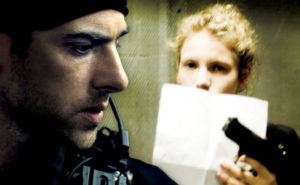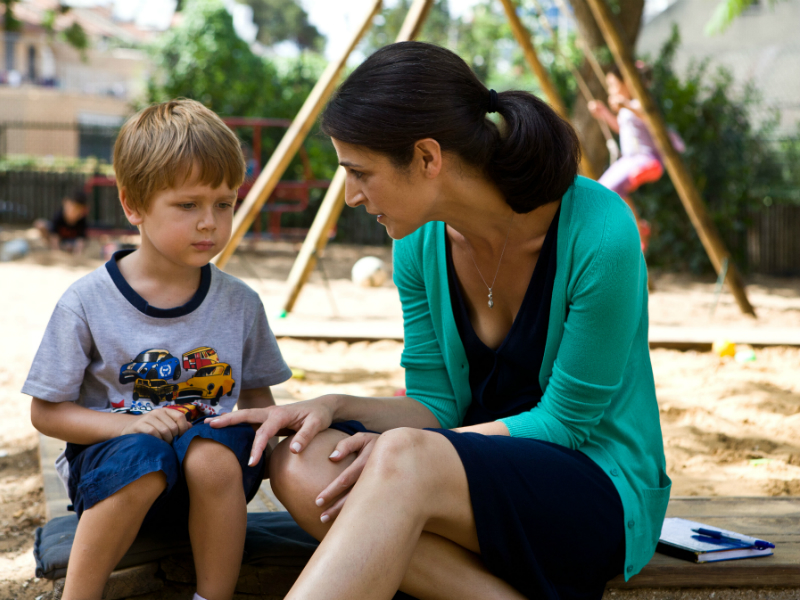When Nadav Lapid was 18, he fantasized about dying for his country. Despite growing up in a household of liberal intellectuals, he internalized the macho expectations of mainstream Israeli society, lionizing martyrdom and heroism. He daydreamed about his military funeral the way most teenagers might look forward to prom.
It staggered him, then, to hear a voice pop into his head years later, shortly after finishing his army service. It was a voice he likens to the spirits guiding Joan of Arc: “Go away,” it told him. “Leave this cursed place and never come back.”
Ten days later, he stepped off an airplane in Paris to begin a new life. It was the mid-1990s, and he decided to cut himself off from all things Israeli – he ignored media stories about it and refused to speak Hebrew, even with his parents over the phone. They caught up in English instead, while he learned French from his new friends.
Those friends were struggling artists who spent much of their time and money watching movies. Lapid didn’t care much for cinema back then, but his social circumstances left him few options.
“My basic French sentences were analyses of movies, because I didn’t know how to say other things,” Lapid recalls over the phone from Tel Aviv. “Cinematically, I was born in France.”
After two years in Paris, he felt Israel calling back to him. “When I lived in France, I felt that Israel was a country of blind people,” he says. He wanted to force Israelis to observe their culture through his eyes, both critically and lovingly.

Lapid has since directed several short films and two features, Policeman and The Kindergarten Teacher. The former, about a counter-terror expert struggling to balance his personal and professional lives, is exactly what you’d expect from a militant young Israeli who matured in Parisian cinemas: it is deft and precise, with quiet camera movements bluntly capturing Israeli machismo.
The Kindergarten Teacher, a partly autobiographical film about a young boy whose prodigious poetry talents are fostered only by his teacher, garnered wider acclaim. It earned international festival awards and an English-language remake starring Maggie Gyllenhaal and Gael Garcia Bernal, which will make its Canadian premiere at the Toronto International Film Festival this September.
“There was something strange about being on set in New York and seeing Maggie Gyllenhaal reciting text I wrote when I was four years old,” Lapid says, referring to the poems he wrote that he inserted into the original script.
Lapid won’t be able to attend the festival itself, but he will be in Toronto weeks earlier, for a retrospective of his work at the TIFF Bell Lightbox.
Brad Deane, the curator, recalls seeing Policeman and being impressed with Lapid’s ability to implement universal themes in a topical story. After seeing The Kindergarten Teacher, “I knew I wanted to show his films in Toronto,” Deane says. “I feel that by showing all of the films together, audiences will be able explore the unity of his vision across his brief career and share the excitement of discovering an incredible emerging talent.”
Lapid appreciates that it’s odd for an emerging director to have a retrospective, but agrees that his films cohere in a way more experienced directors’ works may not. One might strain to find commonalities between Steven Spielberg’s Schindler’s List and Ready Player One, for example, but Lapid’s tight filmography tells an engrossing story of life in the Holy Land.
READ: ALLAN UNGAR IS IN UNCHARTED TERRITORY
“In all my movies, if you dig deep inside, you recognize two declarations,” Lapid says. “One – maybe the most basic, yet the most profound – is to express the way I gaze regarding this very specific moment in existence. The other one is a kind of tendency to dig inside an existential soul, or the collective soul, of these people that we call the Israelis.… I tried to detach myself from Israel, just to discover, in a very common way, that this Israeli destiny is inside of me and I cannot escape it.”
The State of Things: The Films of Nadav Lapid runs at the TIFF Bell Lightbox Aug.16 to 18. For more information, please visit www.tiff.net.
